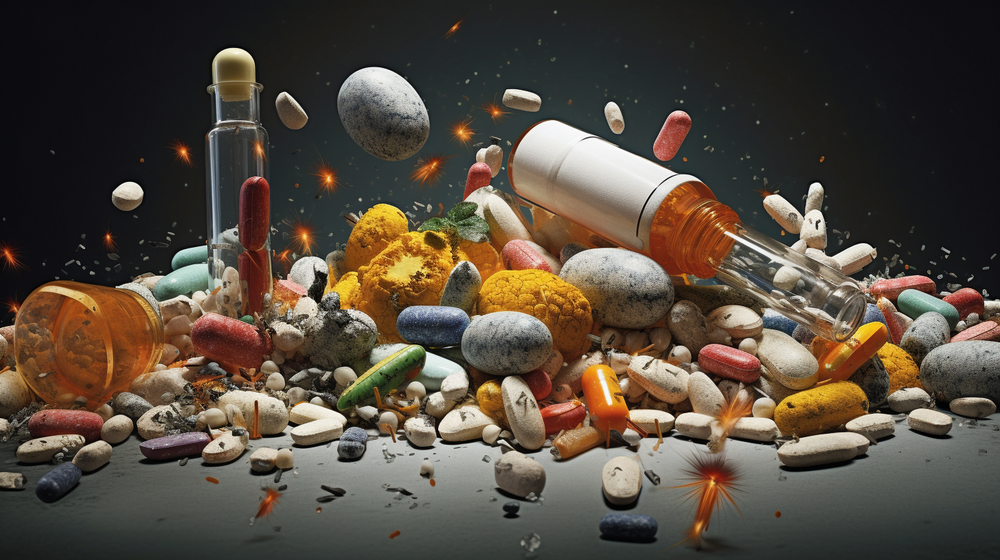You have no items in your shopping cart.

You've likely taken antibiotics before, but have you ever wondered how they affect your gut health? You're not alone.
Yes, antibiotics can be harmful to the gut. While they are designed to kill harmful bacteria that cause infections, they can also kill the healthy bacteria in your gut. This can disrupt the balance of your "gut flora," which assists in digestion and supports your immune system. Disrupting this balance can lead to diarrhea, digestive upsets, and other health issues.
Some research also suggests the changes to your gut flora caused by antibiotics may be long-lasting and might contribute to conditions like obesity, heart disease, and asthma. As with all medications, antibiotics should be taken as directed by a healthcare professional.
Key Takeaways
- Antibiotics are powerful medicines used to fight bacterial infections.
- Antibiotics can disrupt the balance of good and bad bacteria in your gut.
- Beneficial gut bacteria aid in digestion, vitamin production, and immune function.
- Introducing prebiotics and probiotics can support and restore healthy gut bacteria after antibiotic therapy.
Definition of Antibiotics
Simply put, antibiotics are powerful medicines used to fight bacterial infections in our bodies. They work by either killing bacteria or slowing down their growth.
But let's look at the benefits they offer in more detail.
Benefits of Antibiotics
Despite the potential side effects, you're likely to experience considerable health improvement because of the antibiotics' ability to fight off harmful bacteria. Your antibiotic medication is a powerful tool and the benefits of antibiotics far outweigh the possible antibiotic side effects.
Think of antibiotics as your body's personal SWAT team, swooping in to eliminate the malicious bacteria wreaking havoc within your system.
Antibiotics can quickly alleviate symptoms of illnesses such as strep throat, bladder infections, and pneumonia, returning you to your healthy self in no time.
The effects of antibiotics can prevent severe complications from infections like kidney damage from a UTI or rheumatic fever from strep throat.
Lastly, remember that antibiotics can prevent the spread of infections, safeguarding not only you, but those around you.
Embrace the benefits, you're taking a step towards better health.
How Antibiotics Affect Gut Bacteria
You're aware antibiotics help fight off harmful bacteria, but did you know they can also disrupt the balance of good and bad bacteria in your gut?
When taking antibiotics, they can't distinguish between the bacteria you want to keep and the ones you want to get rid of.
This can lead to potential risks such as an imbalance in your gut flora, which we'll discuss next.
Good Bacteria Versus Bad Bacteria
In understanding the impact of antibiotics on your gut, it's crucial to distinguish between good and bad bacteria. Antibiotic therapy can result in antibiotic-associated side effects, including a drastic shift in your gut's bacterial landscape.
- Probiotic strains help maintain a balance by outcompeting bad bacteria for resources.
- Bad bacteria can overgrow during antibiotic use, leading to health problems.
- Antibiotic therapy often doesn't discriminate, killing beneficial gut bacteria along with the harmful ones.
- Beneficial gut bacteria aid in digestion, vitamin production, and immune function.
It's a delicate balance, and understanding this helps you manage your gut health better. Consider a probiotic supplement post-antibiotic therapy to replenish beneficial bacteria, minimize side effects, and restore balance.
Impact of Antibiotic Medication on Gut Microbiome
Taking antibiotics can significantly alter your gut microbiome, and it's essential to understand this impact to better manage your health. Antibiotics are powerful medications, but they don't discriminate between harmful bacteria and the natural flora in your gut, sometimes decimating beneficial stomach bacteria. This imbalance can lead to digestive issues and impede your overall health.
That's where an antibiotic support supplement comes in. It's designed to restore your gut's natural flora impacted by antibiotic medication. They're packed with probiotics that replenish the good bacteria, helping you maintain a healthy gut microbiome.
Risk Factors for Disruption of Gut Flora
While you're often aware of the immediate effects of antibiotics, you mightn't realize they're also a major risk factor for disrupting your gut flora.
Here's what happens: 1. You take antibiotics for a medical condition. 2. They wipe out both harmful and healthy gut bacteria, like lactobacillus acidophilus and bifidobacterium. 3. This disruption of gut flora can lead to health issues. 4. You need antibiotic support to restore the balance.
It's not just about killing the bad guys. It's about preserving the good ones too. Remember, your gut flora isn't just there for show. It plays a crucial role in your overall health.
Supporting Healthy Gut Bacteria During and After Antibiotic Treatment
You've heard about the impact of antibiotics on gut bacteria. Now let's talk about how to support your gut health during and after treatment.
Consider introducing prebiotics and probiotics into your diet. They're known to help cultivate healthy bacteria. This could be just what you need to bounce back after a course of antibiotics.
Prebiotic and Probiotic Supplementation
In this part of our discussion, we'll delve into the importance of prebiotic and probiotic supplementation for maintaining a healthy gut microbiome during and after antibiotic treatment.
- Probiotic bacteria: These are live bacteria that are beneficial for your health. They're found in supplements and some fermented foods. They can help restore your healthy gut flora after antibiotic treatment.
- Antibiotic support: Probiotics like lactobacillus paracasei and bifidobacterium lactis can provide antibiotic support, aiding in the resistance against harmful bacteria.
- Lactobacillus paracasei: It's a type of probiotic bacteria that can boost your immune system and promote a healthy balance of gut flora.
- Bifidobacterium lactis: This bacteria aids digestion and fights off harmful bacteria, supporting your body during and after antibiotics.
A healthy gut is vital, so don't underestimate the power of prebiotics and probiotics.
Conclusion
In conclusion, while antibiotics are a powerful tool in the fight against harmful bacterial infections, their impact on gut health cannot be ignored. They disrupt the balance of gut flora, resulting in potential health issues such as diarrhea and digestive upsets.
There might also be long-term negative impacts including obesity, heart disease, and asthma. However, the introduction of prebiotics and probiotics can help restore healthy gut bacteria after antibiotic therapy.
Hence, while using antibiotics to treat infections, it is crucial to also take measures to maintain gut health. Antibiotic use should always be overseen by a healthcare professional.

This information is intended solely for New Zealand residents and is of a general nature only. No person should act in reliance on any statement contained in the information provided, but at all times should obtain specific advice from a health professional.
